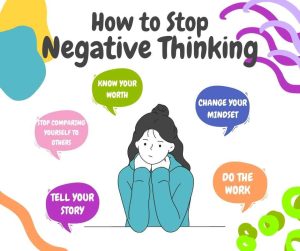- Have any questions?
- +880-1832219025
- englishrajib877@gmail.com
How to Avoid Negative Thoughts

Present Headache of Weddings
November 16, 2023
How to Live a Sustainable Lifestyle
November 22, 2023How to Avoid Negative Thoughts

How to Avoid Negative Thoughts
Negative thoughts refer to pessimistic or unfavorable mental attitudes and beliefs that can affect a person’s emotions, behavior, and overall well-being.
These thoughts often focus on potential problems, shortcomings, or perceived failures.
Negative thinking can be a common aspect of human experience, but excessive or persistent negative thoughts can contribute to stress, anxiety, and depression.
Avoiding negative thoughts can be challenging, but there are several strategies you can employ to help shift your mindset toward more positive thinking. Here are some tips:
Practice Mindfulness:
Mindfulness involves paying attention to the present moment without judgment.
Engage in activities that bring your focus to the present, such as deep breathing, meditation, or simply observing your surroundings.
Challenge Negative Thoughts:
Actively question and challenge negative thoughts. Ask yourself if there is evidence to support these thoughts or if you might be making assumptions.
Often, negative thoughts are based on distorted perceptions.
Positive Affirmations:
Replace negative thoughts with positive affirmations. Affirmations are positive statements that can help challenge and overcome self-sabotaging and negative thoughts.

Gratitude Practice:
Regularly reflect on the things you are grateful for. Keeping a gratitude journal can be a helpful practice. Focusing on the positive aspects of your life can shift your mindset.
Surround Yourself with Positivity:
Spend time with positive and supportive people. Avoid those who bring negativity into your life.
Positive social interactions can have a significant impact on your mental well-being.
Limit Exposure to Negative Influences:
Be mindful of the media and information you consume. Limit exposure to negative news and images, and choose content that inspires and uplifts you.
Set Realistic Goals:
Break larger goals into smaller, more manageable tasks. This can prevent feelings of overwhelm and help you focus on achievable steps, fostering a sense of accomplishment.
Self-Care:
Take care of your physical and mental well-being. Ensure you get enough sleep, eat healthily, and engage in activities that bring you joy and relaxation.
Learn from Challenges:
Instead of viewing challenges as insurmountable obstacles, see them as opportunities for growth and learning.
This perspective can help shift your mindset toward the positive aspects of difficult situations.
Self-Compassion:
Treat yourself with kindness and understanding. Everyone makes mistakes or faces challenges. Instead of being overly critical, practice self-compassion and learn from experiences.

Physical Activity:
Regular exercise has been shown to have a positive impact on mood. Engage in activities that you enjoy and that promote physical well-being.
Focus on Solutions:
Instead of dwelling on problems, focus on finding solutions. Identify steps you can take to address challenges and take action.
Professional Help:
If negative thoughts persist and significantly impact your life, consider seeking the help of a mental health professional.
Therapy can provide tools and strategies to address and manage negative thought patterns.
Remember that it’s normal to experience negative thoughts from time to time, but actively working on changing your thought patterns can contribute to a more positive and resilient mindset over time.
Why Negative Thoughts come in mind
Negative thoughts can arise for a variety of reasons, and they are a natural part of the human experience. Here are some common factors that can contribute to negative thoughts:
Cognitive Biases: Our brains are wired with certain cognitive biases that can lead us to focus on negative information more than positive information.
For example, the negativity bias causes us to pay more attention to and remember negative experiences over positive ones.
Past Experiences: Negative thoughts can be influenced by past experiences, especially if those experiences were challenging, traumatic, or had a strong emotional impact.
Past failures or disappointments may contribute to a negative mindset.
Stress and Anxiety: High levels of stress and anxiety can contribute to negative thinking.
When stressed, the brain may focus on potential threats, leading to a heightened awareness of negative aspects of situations.
Perfectionism: Striving for perfection and setting unrealistically high standards for oneself can lead to constant self-criticism and negative thoughts when those standards aren’t met.
Social Comparison: Comparing oneself to others, especially in today’s social media-driven culture, can lead to feelings of inadequacy and negative self-perception.
Chemical Imbalances: Sometimes, imbalances in neurotransmitters or hormonal fluctuations can affect mood and contribute to negative thoughts.
Conditions like depression or anxiety disorders are examples of this.
Lack of Sleep: Sleep has a profound impact on mood and cognitive function. Lack of sleep can lead to irritability, difficulty concentrating, and an overall negative outlook.
Rumination: Repeatedly dwelling on negative thoughts without finding solutions or positive perspectives can contribute to a negative thought cycle known as rumination.
Examples of Negative Thoughts
Catastrophizing: Assuming the worst possible outcome in a situation, even when it’s unlikely.
Overgeneralization: Making broad, sweeping conclusions based on isolated incidents.
Black-and-White Thinking: Seeing situations in extreme, all-or-nothing terms, without recognizing middle ground or nuance.
Personalization: Taking responsibility for events or situations that are beyond one’s control.
Filtering: Focusing only on the negative aspects of a situation while ignoring any positive elements.
Mind Reading: Assuming you know what others are thinking or that they view you negatively without concrete evidence.
Should Statements: Holding oneself to unrealistic standards and using words like “should,” “must,” or “ought to.”
Self-Blame: Taking on undue responsibility for negative events and blaming oneself excessively.
(FAQ) on how to avoid negative thoughts:
What are negative thoughts?
Negative thoughts are thoughts that focus on the pessimistic or unfavorable aspects of a situation. They often contribute to feelings of sadness, anxiety, or stress.
Why is it important to avoid negative thoughts?
Negative thoughts can impact mental well-being, leading to increased stress, anxiety, and a generally negative outlook on life.
Avoiding them can contribute to a more positive and balanced mindset.
How can I identify negative thoughts?
Pay attention to your inner dialogue. If you catch yourself thinking overly critical or pessimistic thoughts, those may be negative.
Also, notice how your body feels—tension, unease, or a sinking feeling may accompany negative thoughts.
What are some common triggers for negative thoughts?
Negative thoughts can be triggered by stress, criticism (from self or others), failure, uncertainty, and various life challenges.
Identifying these triggers can help you address them more effectively.
How can I break the cycle of negative thinking?
Practice mindfulness and self-awareness. When negative thoughts arise, acknowledge them without judgment and consciously redirect your focus to more positive or neutral aspects.
Are there specific techniques to avoid negative thoughts?
Yes, techniques like positive affirmations, cognitive restructuring, and reframing can be helpful.
Engaging in activities you enjoy, maintaining a gratitude journal, and seeking social support are also effective strategies.
Can physical activity help in avoiding negative thoughts?
Yes, regular exercise has been shown to have positive effects on mood and mental well-being. It releases endorphins, which are known as “feel-good” hormones.
How does practicing gratitude help?
Focusing on what you’re grateful for can shift your perspective from what’s lacking or negative to what’s positive in your life. This practice helps cultivate a more optimistic outlook.
Is it possible to completely eliminate negative thoughts?
It’s unrealistic to completely eliminate negative thoughts, as they are a natural part of the human experience.
However, you can learn to manage and minimize them through various strategies and mindset shifts.
When should I seek professional help for negative thoughts?
If negative thoughts significantly impact your daily life, relationships, or overall well-being, it’s advisable to seek help from a mental health professional.
They can provide guidance, support, and therapeutic interventions.
Related Posts:





